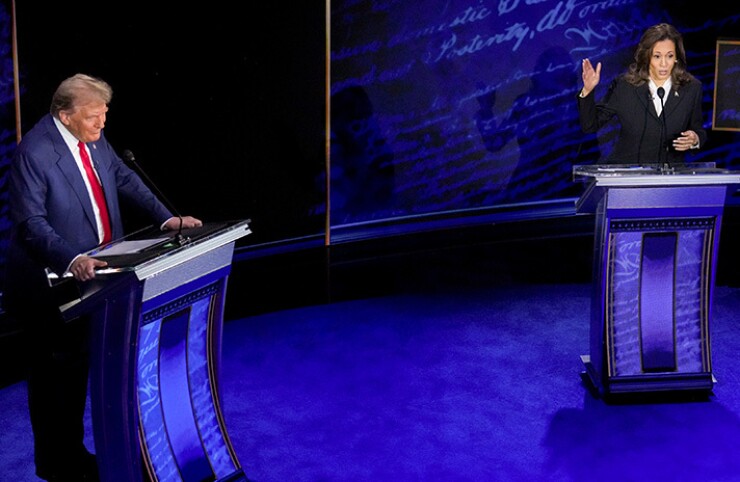Vice President Kamala Harris and former President Donald Trump shined no new light on the economic and tax policies important to the municipal bond market during their high-stakes debate Tuesday night, though brief mentions of housing, energy policy and tariffs carry modest interest to participants.
"The debate was pretty light in general," said Matt Fabian, partner at Municipal Market Analytics. The widespread perception that Harris did well will help her recent polling momentum continue, Fabian said.
"Harris' strong debate performance makes, at a minimum, divided government a bit more likely: a good thing for retention of the tax-exemption going forward," he said.

During the 90-minute exchange, Harris promoted her policies for an expanded child tax credit — an issue that some Republicans support as well — and her proposal to increase housing stock by three million and offer a $25,000 subsidy for first-time homebuyers. Those issues are of interest to cities and states, said Emily Brock, federal liaison at the Government Finance Officers Association.
Trump's tariff proposal on foreign goods, which he promised would be "substantial," also impacts issuers with the potential to disrupt the supply chain and thus infrastructure projects, Brock said.
"But I think with [Tax Cuts and Jobs Act of 2017] tax plan revival that's going to take place next year, we're all trying to get a sense of how each promise fits into the larger debate," she said.
"[The state and local tax deduction], municipal bond tax exemption and any provisions that would give issuers the market support they need to make infrastructure happen were absent from the debate. Also absent was the rear view/closeout of any of the stimulus support, which may also be another puzzle piece of any pay-fors for the tax discussion."
Fabian noted that Harris' housing policies may be positive for municipals either through the issuance of new bonds or more housing, but adds the plan has yet to be fleshed out yet.
Her homebuyer incentive would be inflationary "for the already troubled housing market," Siebert chief investment officer Mark Malek warned in a Wednesday commentary.
The outcome of November's election will not only decide the presidency but also shape Congress as it gears up to
Harris' debate "win is already making waves in the market," said James Pruskowski, chief investment officer and co-founder of asset management firm 16Rock. Treasury rates rallied early ahead of the CPI report, which then tempered the rally "as expectations for a 25 cut from the Fed next week grew, while odds of a 50 bp cut faded," Pruskowski said.
"Meanwhile, municipals are also seeing strength," he said. "As we approach the election, volatility is on the horizon. The candidates' policies are vastly different. The Democrats are leaning towards higher taxes, which could be a massive win for municipal bonds. If the corporate tax rate rises to 28%, we could see institutional demand make a major comeback."
For the broader markets, the debate offered "little new information for the market to digest," said Siebert's Malek. "Tax code changes would take Congressional support while tariffs can be levied by executive order," Malek said. "Ultimately the races for Congress, not necessarily the Presidential race, will decide some of these key issues."
Tuesday's debate was the only one scheduled, although Harris reportedly is seeking a second go-round.
In a Wednesday blog post, UBS said it retained its probabilities following the debate. The bank puts the probability of a Harris win with a divided Congress — Republican Senate and Democrat House — at 40%, followed by a 35% chance of a Republican sweep. It puts the chance of a Blue sweep at 15% and of a Trump victory with a divided government at 10%.





